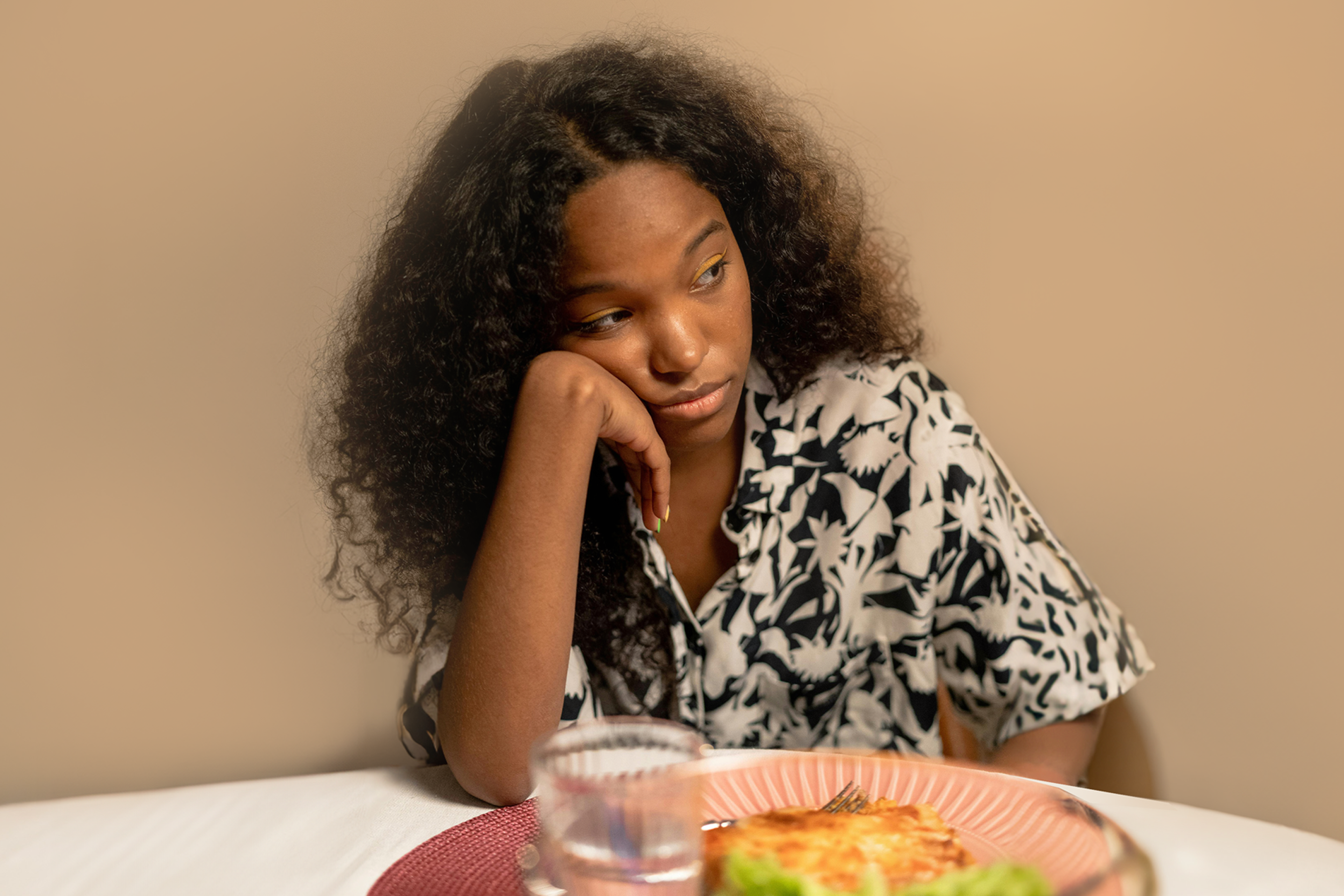


I spent several years of my life living in an energy (calorie) deficit. At the time, I never stepped back to wonder what happens if you don’t eat enough. I didn’t understand how my entire being—mind, body, and emotions—were being affected by living that way. I’m not being dramatic when I say that every part of me was drastically and negatively impacted by undereating. I suffered serious consequences, some of which I’ll share here Fortunately, I committed to healing and recovery over a decade ago, and the first step was moving out of an energy imbalance by eating more food, exercising less, and learning how to manage stress.
Today, as an eating disorder dietitian, I see how the effects of undereating infiltrate every facet of my clients’ lives. Most eating disorders include undereating as a main symptom, which can have a multitude of different causes and triggers, from shame and guilt to body image distress to maladaptive coping strategies and beyond. Several of my clients presented with undereating that stems from trauma, and they’re using restriction to numb, disassociate, and indirectly express hard feelings.
People without eating disorders can also experience the negative effects of undereating. Recent research shows a high prevalence of undereating in certain populations, like athletes who have low energy availability, which is when undereating is coupled with caloric expenditure, creating a negative energy imbalance. “Some people find themselves in chronic deficits unintentionally—their lives are busy, schedules are packed, perhaps their physical activity is high, or they’re struggling with a low appetite,” says Caroline Burkholder, MS, RD, CEDS. “Others may find their chronic deficit has deeper roots: body image concerns, pressure from family members or coaches to maintain a low weight, or an internalized list of rigid food rules.” Sadly, undereating and setting goals to undereat are normalized and even praised in our society, without much (if any) regard for the negative impact it might have.
Let’s look at what actually happens if you don’t eat enough, and how it can significantly impact you mentally, emotionally, and physically.
1. Emotional dysregulation
In my practice, I notice heightened anxiety is one of the main consequences of not eating enough, and, personally, I know now that spending years feeling on edge and suffering panic attacks was a direct result of not eating enough food.
Undereating, which often comes with malnutrition and excessive weight loss, can also cause or worsen depression as well as anxiety due to changes in brain chemistry. Kristin Grimes, RDN, LD, explains that inadequate nutrition can lead to tissue damage in the brain, as well as a lack of nutrients—specifically vitamin B12, folate, and zinc—that may cause depression, cognitive decline, and irritability.” She also notes that malnutrition may lead to a decrease in the production of dopamine and serotonin, two mood-regulating hormones, which can worsen symptoms of anxiety and depression.
On top of that, undereating makes it more difficult to deal with tough emotions and hard life experiences. “People who frequently underfuel often describe an increase in irritability, a decrease in patience, and a tendency to have diminished capacity for emotional regulation,” Burkholder explains. “They tend to experience mood swings, with less tolerance for ‘riding emotional waves’ throughout the day.”
Once I was adequately eating and addressing any underlying emotional issues (which undereating is typically “helping” to numb in the first place), I became significantly more equipped to manage anxiety, navigate dark moods, and generally endure my life’s inevitable ups and downs. Typically, I notice similar emotional improvements in clients who begin eating enough.
2. Food preoccupation and cognitive difficulties
When I was undereating, I remember feeling like I was abnormal because most of my mental space was taken up by thoughts of food. It was hard for me to stay present in conversations or to pay attention to my work and studies. Now, it’s one of the first concerns clients who are undereating share with me when we start work together: they believe they’re uniquely obsessed with food, when in fact their bodies are simply trying to survive. “Your body doesn't understand that this ‘famine’ is self-inflicted, so it's going to be on high alert to increase its ability to survive and find food,” explains Equip Nutrition Director Erin Reeves, RD. “You might be thinking about food more or feel more out of control when you do eat because your body can't trust there won't be a famine again.”
In one famous landmark study (called the Minnesota Study on Human Starvation by researcher Ancel Keys), a group of men were intentionally underfed over an extended period. They reported the earliest and most present symptom of their starvation experience was a fixation on and thoughts about food. All the men said they experienced “intellectual inefficiency,” which showed up in things like decreased concentration, slower rate of learning, and poorer judgment. Additionally, some men responded by gathering recipes and cookbooks, eating faster than normal, and dreaming of food. Some men said they wanted to watch others eat often while others said they couldn’t bear doing so—in either case, their thoughts and emotions were ruled by food.
Along with making it hard to concentrate in high-demand settings like work and school, undereating can also impact the ability to keep up with everyday tasks and cause brain fog. A 2021 meta-analysis shows anorexia (with undereating as one of its main aspects) is linked to cognitive underperformance, including significantly impaired memory.
The good news? Once undereating is resolved, food preoccupation and obsession often dissipates relatively quickly, freeing up mental space for more important aspects of life. Plus, including foods rich in vitamin K, folate, lutein, and beta-carotene (like leafy greens such as spinach or collards), and foods rich in omega-3 fatty acids and unsaturated fats, such as fatty fish (like salmon and walnuts), and flavonoids (like berries) can further support a healthy brain.

3. Personality changes
When you aren’t eating enough food, Burkholder says, “much of the ‘airtime’ in your mind is consumed by thoughts of food, leaving little room for other things.” This is one of the non-physical undereating effects that I find scariest: without room or energy for life outside of food and body, it’s impossible to live in alignment with your true core values. In other words, it’s impossible to be yourself.
In the landmark study I mentioned, the men reported “dramatic” personality changes alongside emotional issues like increased irritability. These personality changes included loss of sexual interest, decrease in self-initiated activity, and lethargy. Underfueling can also lead someone to become a more rigid thinker than they are when they’re eating enough.
Undereating can also cause social withdrawal, which Equip peer mentor Jamie Drago experienced firsthand. “I was so focused on the amount I was eating—and deviating from what I thought was ‘right' brought about such anxiety—that I ended up isolating myself from family and friends,” Drago shares. “This took a toll on my emotional and mental health because I was having fewer and fewer avenues for joy and community.” She says the social isolation increased her anxiety and depression and served as recovery fuel once she was working with a therapist and dietitian. “Together, the three of us worked on what was getting in the way of fueling myself properly, using things like social isolation and mood concerns as motivation for making changes,” she says.
In my work with clients who aren’t eating enough, the changes that I observe over our time together can be mind-blowing. As they work toward fueling their body adequately, it’s as if they’re re-emerging from a dark haze that was keeping them disconnected from themselves, their lives, and the people around them. Their sense of humor and mental flexibility returns, their voices become more authentic, hobbies are more interesting, their ability to access life’s pleasures come back, boundaries become easier to set and relationships richer, and their genuine paths in life often become clearer.
4. Suppressed metabolism
Other signs of undereating include decreased basal metabolic rates (BMR), which is the energy bodies need to perform basic functioning. The simplest way to think about this is that your body is focused on survival, so if you’re not adequately fueling your body, it will slow down all of its processes in order to conserve energy and survive with less energy. “There are no tricks around this by eating a certain spicy food or doing a certain workout,” explains Reeves. “Your metabolism will slow down if you aren't giving it enough."
This is one of the reasons that so many people who spend years yo-yo dieting to lose weight often end up at higher weights than when they started: their bodies get thrown off by undereating and try to recalibrate by adjusting metabolic speed, only to get confused again, and the cycle continues.
Signs of a suppressed metabolism can also include fatigue, dry skin, and feeling cold often. And despite what you might read on social media, it’s impossible to have a healthy metabolism without eating enough food.
5. Reproductive disturbances
Amenorrhea (or loss of period for more than three months) was my body’s main indicator of not yet being fully recovered from my own eating disorder. It’s a common side effect of undereating and can lead to a myriad of issues, including infertility and osteoporosis. Food restriction, anxiety, depression, emotional stress, excessive exercise, energy imbalance, and malnutrition are associated with the development of amenorrhea, according to The Journal of Clinical Endocrinology & Metabolism.
One 2022 research review concluded that low energy availability from undereating can suppress all reproductive hormones. “In females, levels of estradiol and progesterone—two important reproductive hormones—decrease. Estradiol is responsible for bone growth and remodeling, so low estradiol levels can quickly diminish bone density,” Burkholder explains. “In males, low energy availability disturbs testosterone levels and leads to fatigue, low sex drive, sexual dysfunction, and low bone mineral density.” Essentially, when you don’t eat enough, your body prioritizes vital functions, like heartbeat and lung expansion, and shuts down processes it deems non-essential. “Your body downregulates to conserve as many calories as possible, and that means forfeiting reproductive function,” Burkholder adds.
Once undereating is reversed and energy (calorie) balance restored, hormonal health usually follows. And while there’s not one specific way of eating to restore hormonal balance, it’s important to eat enough food from each macronutrient (carbohydrates, fats, and proteins) group, which a dietitian can help guide.
6. Nutrient deficiencies and muscle breakdown
Another serious side effect of undereating is the development of nutrient deficiencies, which can lead to health conditions like anemia (often a result of iron deficiency), cold intolerance, hair loss, skin problems, insomnia, bone issues, and a weakened immune system. “Your immune system will be depressed, causing an increase in infection, cold and flu, or other illnesses,” says Reeves. “Your heart rate slows, there’s less oxygen flow, dizziness, and fatigue.”
Undereating can also cause catabolism, or when the body breaks down lean tissue like muscle for fuel, which can lead to loss of muscle mass and muscle wasting. This may be particularly noticeable for athletes experiencing undereating. “Your muscles will get broken down faster because there are neither the energy nor the building blocks—amino acids and protein—available to maintain itself,” Reeves explains.
Since the heart is largely made of muscular tissue, it will also start to weaken with chronic underfueling, and vital signs like blood pressure and heart rate can fall dangerously low. “This weakening of the heart reduces the ability to pump blood throughout the body, which can lead to fatigue and shortness of breath,” Grimes explains. “Malnutrition also disrupts the electrical activity of the heart, the power behind the heart’s contractions, which can be fatal.”
And without enough blood sugar circulating in your blood, which can occur when you’re regularly undereating and have depleted all the glucose stores in your liver and muscles, you can experience hypoglycemia, which can also be deadly. Plus, if you’re engaging in physical activity while undereating, your muscles will have a harder time recovering and you’re likely to experience decreased athletic performance, according to Burkholder.
Restoring energy (calorie) balance, finding a relative balance of food groups at each meal and snack, and potential supplementation (with the help of a dietitian) is the best route for healing deficiencies and muscle breakdown.
7. Digestive issues
Grimes explains that in addition to affecting heart tissue, malnutrition can result in the breakdown of tissue in the digestive tract, which can, over time, lead to a weakening of muscles in the stomach and intestines. In fact, research shows malnutrition and weight loss from undereating can slow down the gastrointestinal (GI) tract, which can cause general GI dysfunction, as well as issues like gastroparesis (or slowed movement or motility of stomach muscles), constipation, reflux, heartburn, bloating, and diarrhea. Reeves explains that undereating will also decrease the amount of enzymes your body makes to break down food, leading to further GI symptoms. In my practice, I’ve observed GI disturbances from undereating that cause significant disruptions in clients’ day-to-day functioning and overall quality of life.
Along with eating enough food on a regular basis (usually at least every three to five hours during the day), digestive issues can also be helped by adequate and consistent hydration, increased yet gradual fiber intake, mindfulness practices, and other interventions led by a dietitian.

8. Feeling out of control
Circling back to the landmark study I mentioned, the men reported that once the restriction period ended, they felt an initial loss of control around food during the refeeding period. Some of them reported wanting to eat continuously, while others said they binge ate (and never had before the experiment). More than half of them reported overeating.
In my work, I’ve noticed that most of my clients are surprised when they realize their bingeing or overeating is often rooted in undereating. The thing is, when we’re underfed, our bodies will do everything possible to get us to reclaim a state of equilibrium, and that can sometimes manifest in out-of-control eating, binge eating, or an inability to listen to and honor your hunger and fullness cues. Undereating followed by binge eating can become a vicious cycle, often accompanied and enforced by feelings of guilt, shame, and frustration.
So, once undereating is reversed, it can take time to feel in charge after a period of feeling out of control around food. However, with a commitment to adequate and consistent nourishment every day, it’s entirely possible to put yourself back in the driver’s seat.
9. Weakened immune system
Getting adequate nourishment is like putting on a strong suit of armor each day, and when the armor disappears or is weakened, every bodily system is compromised—and this includes your immune system. While it’s normal for humans to get sick from time to time, undereating can suppress your immunity, making you more likely to get sick, prolonging illness, and making wounds harder to heal. And the nutrient deficiencies caused by undereating include a shortage of key immune-regulating nutrients, like protein, fat, vitamins like A, C, and D, and minerals like zinc and selenium.
Like the other undereating effects explored today, eating enough food and finding nutritional equilibrium can, in time, help repair and strengthen your armor of immunity.
How to stop underfueling your body
If you’re experiencing any of the signs and symptoms discussed above, you may be undereating. To better understand if you’re not giving your body enough food, ask yourself these questions:
Do I…
- Feel heightened anxiety and depression?
- Feel more irritable than usual?
- Have obsessive food thoughts?
- Isolate myself socially because of food?
- Feel out of control around food?
- Have a missing period?
- Experience significant digestive discomfort?
- Get cold or sick often and easily?
Regardless of your symptoms, once you’ve found yourself in a state of energy (calorie) imbalance, it’s tough to restore balance on your own—whether or not you have an eating disorder. That’s why establishing or re-establishing nutrition adequacy and reversing undereating effects usually takes professional guidance from a team of providers (usually at least a therapist and a dietitian).
“Learn from a non-diet dietitian how much your body really needs. It's difficult to use online calculators or providers that endorse weight loss, because you will likely get a calorie goal that is far too low,” Reeves says. “Stay in your lane: don't compare yourself to others or ask your friends how many calories they eat. Your body is its own unique machine, and looking at a snapshot from a peer or someone's 'what I eat in a day' is not going to give you the personal guidance you need to thrive.”
Drago also suggests working with a dietitian, “ideally a dietitian with expertise treating eating disorders or who identifies as taking a ‘non-diet approach’ to be sure to not reinforce some of the potential causes of undereating, like fad diets or food restriction,” she says. “A dietitian and therapist combination can be really helpful to address not only the nutrition needs but also the emotions that may come up throughout the process.”
With your dietitian, you will also learn how to nourish yourself (typically in a regular pattern of balanced meals and snacks every few hours throughout the day) to meet your specific energy and nutrient needs, and learn other practices as necessary, such as intuitive and mindful eating and flexible meal planning. Check out more skills and insights on how to stop undereating here.
Undereating effects are widespread and have serious impacts on mental, physical, and emotional well-being. But there’s good news: most can be reversed with adequate nourishment. Since I stopped undereating and now live within energy balance, my anxiety is manageable, I feel generally more at ease, my focus and ability to stay present with others is good, I have ample brain space for life outside of food, and my reproductive system is fully functioning.
While the road there can be fraught and challenging, trust that your hard work and commitment will pay off in powerful ways for the rest of your life.
FAQs
What are the signs that I’m not eating enough?
There are several symptoms of not eating enough, including food preoccupation and obsession, loss of control around food, amenorrhea (loss of period for more than three months), personality changes like increased irritability, lethargy, and digestive issues like constipation and bloating.
How does undereating affect metabolism?
Undereating can suppress your metabolism by decreasing your basal metabolic rate (BMR), which is the energy your body needs to perform basic functioning. Without enough calories, your body will slow all its processes to try and save energy and survive with less of it.
Can undereating cause digestive issues?
Some signs of undereating can include digestive issues, like general GI dysfunction, and gastroparesis (or slowed movement or motility of stomach muscles), constipation, reflux, heartburn, bloating, and diarrhea. Such digestive issues can significantly impact overall health and quality of life.
What should I do if I suspect I’m not eating enough?
If you think you may be undereating, it’s important to seek professional guidance from a dietitian, who will clarify your nutritional needs, and help you tackle any barriers to adequate nourishment and restore energy (or calorie) balance, if necessary.
How can I balance my diet to ensure I’m getting enough nutrients?
Generally, ensuring adequate nutrients comes naturally along with first eating enough and then learning how to find a relative balance of all food groups (carbohydrates, proteins, fats, vegetables, fruits, and dairy or dairy alternatives) on your plate. Each food group offers different and essential nutrients that work together to support your health and well-being. Again, it’s important to work alongside a dietitian to help you understand your specific nutrition needs.
- Logue, D. M., Madigan, S. M., Melin, A., Delahunt, E., Heinen, M., Donnell, S.-J. M., & Corish, C. A. (2020). Low Energy Availability in Athletes 2020: An Updated Narrative Review of Prevalence, Risk, Within-Day Energy Balance, Knowledge, and Impact on Sports Performance. Nutrients, 12(3), 835. https://doi.org/10.3390/nu12030835
- Issue 59 I The Starved Brain – Can What We Eat Determine How We Think? (n.d.). Nedc.com.au. https://nedc.com.au/eating-disorder-resources/find-resources/show/issue-59-i-the-starved-brain-can-what-we-eat-determine-how-we-think#:~:text=Restricted%20eating%2C%20malnourishment%2C%20and%20excessive
- Lachance, L., & Ramsey, D. (2015). Food, mood, and brain health: implications for the modern clinician. Missouri Medicine, 112(2), 111–115. https://www.ncbi.nlm.nih.gov/pmc/articles/PMC6170050/#:~:text=Several%20nutritional%20deficiencies%2C%20such%20as
- Eckert E.D. et al. (2018). A 57-Year Follow-Up Investigation and Review of the Minnesota Study on Human Starvation and its Relevance to Eating Disorders. Archives of Psychology, 2(3) https://www.researchgate.net/publication/324507398_A_57-YEAR_FOLLOW-UP_INVESTIGATION_AND_REVIEW_OF_THE_MINNESOTA_STUDY_ON_HUMAN_STARVATION_AND_ITS_RELEVANCE_TO_EATING_DISORDERS
- The Starvation Experiment. (2023, May 9). Duke Department of Psychiatry & Behavioral Sciences. https://psychiatry.duke.edu/blog/starvation-experiment
- Stedal, K., Broomfield, C., Hay, P., Touyz, S., & Scherer, R. (2021). Neuropsychological functioning in adult anorexia nervosa: A meta-analysis. Neuroscience & Biobehavioral Reviews, 130, 214–226. https://doi.org/10.1016/j.neubiorev.2021.08.021
- Harvard Medical School. (2024, April 3). Foods linked to better brainpower. Harvard Health. https://www.health.harvard.edu/healthbeat/foods-linked-to-better-brainpower
- Eating disorders - Symptoms and causes. (n.d.). Mayo Clinic. Retrieved April 1, 2024, from https://www.mayoclinic.org/diseases-conditions/eating-disorders/symptoms-causes/syc-20353603#:~:text=Dieting%20and%20starvation.&text=Starvation%20affects%20the%20brain%20and
- Gordon, C. M., Ackerman, K. E., Berga, S. L., Kaplan, J. R., Mastorakos, G., Misra, M., Murad, M. H., Santoro, N. F., & Warren, M. P. (2017). Functional Hypothalamic Amenorrhea: An Endocrine Society Clinical Practice Guideline. The Journal of Clinical Endocrinology & Metabolism, 102(5), 1413–1439. https://doi.org/10.1210/jc.2017-00131
- Montani, J. (2021). Ancel Keys: The legacy of a giant in physiology, nutrition, and public health. Obesity Reviews, 22(S2). https://doi.org/10.1111/obr.13196
- Wasserfurth, P., Palmowski, J., Hahn, A., & Krüger, K. (2020). Reasons for and Consequences of Low Energy Availability in Female and Male Athletes: Social Environment, Adaptations, and Prevention. Sports Medicine - Open, 6(1). https://doi.org/10.1186/s40798-020-00275-6
- Iwasa, T., Minato, S., Imaizumi, J., Yoshida, A., Kawakita, T., Yoshida, K., & Yamamoto, Y. (2021). Effects of low energy availability on female reproductive function. Reproductive Medicine and Biology. https://doi.org/10.1002/rmb2.12414
- National Centre for Eating Disorders. (2011). The Effects Of Under-Eating | National Centre for Eating Disorders. National Centre for Eating Disorders. https://eating-disorders.org.uk/information/the-effects-of-under-eating/
- Cost, J., Krantz, M. J., & Mehler, P. S. (2020). Medical complications of anorexia nervosa. Cleveland Clinic Journal of Medicine, 87(6), 361–366. https://doi.org/10.3949/ccjm.87a.19084
- Mathisen, T. F., Heia, J., Raustøl, M., Sandeggen, M., Fjellestad, I., & Sundgot‐Borgen, J. (2019). Physical health and symptoms of relative energy deficiency in female fitness athletes. Scandinavian Journal of Medicine & Science in Sports, 30(1), 135–147. https://doi.org/10.1111/sms.13568
- MayoClinic. (2022, June 11). Gastroparesis - Symptoms and causes. Mayo Clinic. https://www.mayoclinic.org/diseases-conditions/gastroparesis/symptoms-causes/syc-20355787
- Eckert E.D. et al. (2018). A 57-Year Follow-Up Investigation and Review of the Minnesota Study on Human Starvation and its Relevance to Eating Disorders. Archives of Psychology, 2(3) https://www.researchgate.net/publication/324507398_A_57-YEAR_FOLLOW-UP_INVESTIGATION_AND_REVIEW_OF_THE_MINNESOTA_STUDY_ON_HUMAN_STARVATION_AND_ITS_RELEVANCE_TO_EATING_DISORDERS
- Munteanu, C., & Schwartz, B. (2022). The relationship between nutrition and the immune system. Frontiers in Nutrition, 9(1). https://doi.org/10.3389/fnut.2022.1082500







